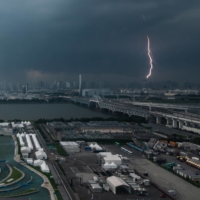Prime Minister Yoshihide Suga’s government put Tokyo under its fourth COVID-19 state of emergency on Monday in an effort to contain a resurgence in coronavirus infections.
With the measure, to last until Aug. 22 — a period that will cover the duration of the Tokyo Olympics — the government aims to curb the movements of people during the global sports event, as well as the summer vacation including Japan’s Bon holiday in mid-August.
The Summer Games, which will open July 23 and end Aug. 8, will be held behind closed doors at almost all venues.
Besides Tokyo, a COVID-19 state of emergency in Okinawa Prefecture, as well as a quasi-emergency in Chiba, Saitama, Kanagawa and Osaka prefectures, which had been set to expire at midnight Sunday, were extended to Aug. 22.
The quasi-emergency in five other prefectures — Hokkaido, Aichi, Kyoto, Hyogo and Fukuoka — expired at midnight Sunday as scheduled.
Compared to a state of emergency, the quasi-emergency carries fewer restrictions on business activity and targets high-risk areas rather than entire prefectures.
In areas under the state of emergency, food service establishments are prohibited from serving alcohol and required to close by 8 p.m.
Under the quasi-emergency, serving alcohol is banned in principle, but some establishments may be allowed to serve alcohol until 7 p.m., subject to a governor’s approval, with proper anti-virus measures in place.
In Tokyo, major commercial facilities are obligated to close by 8 p.m. Attendance at large events is capped at 5,000 people or 50% of a venue’s capacity, whichever is fewer.
The capital entered into its first COVID-19 state of emergency in April 2020 and a second emergency in January this year.
Suga declared a third emergency for Tokyo in April, which had been initially scheduled to last about two weeks but was extended until June 20.
The emergency was eased to a quasi-emergency for Tokyo on June 21 but it went back to the fourth emergency after just about three weeks due to the recent rebound in infections.
In a time of both misinformation and too much information, quality journalism is more crucial than ever.
By subscribing, you can help us get the story right.
SUBSCRIBE NOW



